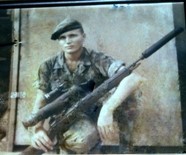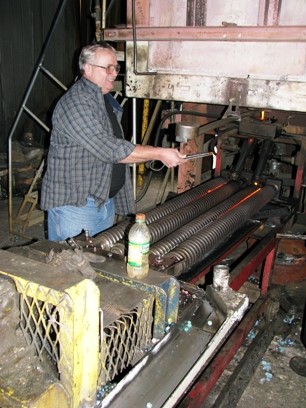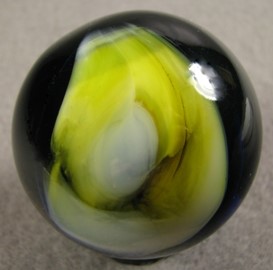Excerpted from “JABO a Classic” by Steve Sturtz
“He’s so quick, so hospitable and so willing to share what he had. Two or three times, he pulled a marble out of his pocket and handed it to me,” Chuck Dennison said.
If you are lucky enough to go to the JABO factory in Reno, Ohio then you will be lucky enough to meet David McCullough. David is a hands-on leader. He can do any job in the factory at any time and in fact, he does.
He was born on March 17th, 1948, and raised in Pennsboro, one of many children in a large family. His dad, who worked in the timber trade, died when he was very young. He graduated from high school where he was a running back and a member of the debate team. He did his turn overseas.

From the collection of David Chamberlain.
Vietnam sent home a hero – a highly decorated hero with three purple hearts, a silver star, six five bronze stars and a couple of air medals. When he left that part of the world, he left an offer of a field commission behind and came home, very glad and thankful to be alive.
“When I came back from Vietnam, I went to the glass factory. I worked carrying glass in and then I advanced to glass blower. Pennsboro Glass was a glass plant where they made hand-blown glass. That is what I grew up in, handmade glassware. Then, I left and went to the steel mills in Columbus, Ohio. I worked up there for two or three years. I was asked to take a more supervisory role and I didn’t want to take it because of the labor problems. So I left and went back home.”
He took his wife Bonnie and his two young sons back to Pennsboro. “Columbus is a larger metropolitan area. When my second son was born, I realized what I had growing up in a smaller school district. My oldest son was in grade school. I didn’t want them to grow up in this. I wanted them to be able to go out, walk down the street and play on outdoor courts without anyone standing armed guard.”
He began working in Champion Agate the same year and within two weeks he was the plant manager. “I had the abilities and so they let me run it.

They were only running one machine when I first started, but they were getting ready to start a second one. I did it all. I also took care of the managerial part as I was running the machines. It was a small company at the time, but we grew. We got a few nice orders. They turned it all over to me. They said if you want to do it, go do it.
It was just a short period of running machines. I went into management and shipping. I still ran the machines off and on, when people didn’t show up for work. Even here at JABO, I go out there and run the machines a couple of days a week. By doing that, the staff out there realized that what they do for a living, I was willing to do for a living. I didn’t do that for an hour. I did it for the whole shift. In a hundred degree weather, I was there. The workers would listen to me because I was saying it from experience.”
The guy who sets the standard of leadership is the guy who participates and participates aggressively and participates the most when it’s the ugliest.

David also made marbles in his spare time beginning in the early eighties. He has, in his office, a wooden block as a memento that he used to round the marbles. It has the date 11-4-83 which is when he burned up the last of these wooded blocks and then began using a metal one. Until the early
nineties, he worked along side his friend, George Williams in George’s shop. They melted down some Vitro Anacortes marbles to create their own unique ones. Always willing to try new marble techniques, they took a previously made marble and embedded the Anacortes marble onto it. This was done with the use of a hot plate. Melting the smaller marble and flattening it as much as possible, they then joined it to the larger marble and rounded the whole thing as much as possible.
“George Williams and I would make marbles in our spare time. George had his own glass shop. Bob Hamon would say to us, ‘What are you making marbles for? You could make more money making vases.’ Bob was a glass artist. He made hand-formed plates and vases.”
In 1991, he was asked to come to JABO. He was given a title, stock and a free rein. His artistry and chemical wizardry has put this company on the map and in the history books.
